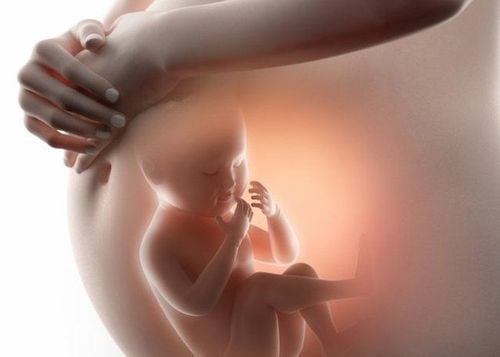This is an automatically translated article.
The article is professionally consulted by Specialist Doctor II Lai Thi Nguyet Hang - Department of Obstetrics and Gynecology - Vinmec Ha Long International Hospital.
During pregnancy, most pregnant women have sleep disorders, in which insomnia accounts for 90%. The following article will help us better understand the causes of insomnia during pregnancy.
In the early stages of pregnancy, usually pregnant mothers will sleep more due to changes in the body when it has to increase the intensity of blood and oxygen mobilization to create the placenta to nourish the fetus. However, in the last months of pregnancy, most pregnant women experience insomnia. Insomnia during pregnancy can be due to the following reasons:
1. Anxiety and stress cause insomnia during pregnancy
During pregnancy, the pregnant mother's body produces pregnancy hormone (also known as progesterone) that makes the mother's mood become sensitive, easy to feel anxious or angry because of small things. In addition, worries about the development of the baby, the plans after giving birth, the family - social relationships can also affect the psychology of the pregnant mother, thereby leading to insomnia when pregnant. Pregnant .
Therefore, women during pregnancy should pay attention to keep a comfortable and relaxed mood. In case you feel unhappy about something, you should confide, share with friends and family to get relief.
2. Digestive problems
In the last months of pregnancy, the growing fetus causes the stomach to be compressed, causing food to be pushed back up the esophagus. In addition, during pregnancy, the mother's digestive system is also less active, leading to food stagnation in the stomach for a long time, causing symptoms of indigestion, heartburn, and constipation.In addition, due to too many nutrients during pregnancy, the pregnant mother's body does not absorb all nutrients, causing backlog, along with hormone changes during pregnancy combined with digestive problems. The above chemical causes the mother to have trouble sleeping, not sleeping deeply, and insomnia.
Applying a scientific, adequate and punctual diet will help improve digestive problems, making pregnant women sleep better. Drinking a cup of hot milk before going to bed is not a bad idea for pregnant women who often have insomnia.
3. Breathing problems
During the early stages of pregnancy, hormonal changes cause the mother's breathing to become slow and deep, leading to a feeling of breathing difficulty. In the later stages, when the uterus invades and compresses the diaphragm, obstructing the diaphragm's operation, the pregnant woman feels even more difficult to breathe. This also means that pregnant women need to breathe more to get enough oxygen to supply the body. According to statistics, a woman's breathing capacity can increase by 40% during pregnancy, but the amount of oxygen only increases by 20%, indicating that the mother exhales more carbon dioxide than usual. Low levels of carbon dioxide in the blood make pregnant women feel tired, affecting the quality of life, including sleep.
4. The fetus is growing bigger and bigger
The growing fetus makes it difficult for the mother to find a comfortable sleeping position that is still safe for the baby, leading to insomnia during pregnancy.
Experts recommend lying on the left side is the most suitable position for pregnant women. In addition, special pillows for pregnant women can be used to improve sleep quality.

5. Increased heart rate
During pregnancy, the heart has to work harder than usual to pump blood to the uterus. This is also a cause of insomnia during pregnancy.
6. Frequent urination at night and increased urea content
During pregnancy, the kidneys have to work 30-50% more than normal, leading to higher levels of Urea and more urine in the bladder. In addition, when the uterus grows large, it compresses the bladder causing discomfort and frequent urination, even at night, leading to insomnia and poor sleep in pregnant women.
7. Cramps and back pain
Cramps often appear suddenly in the thighs, calves and then turn into pain during pregnancy, disrupting the mother's sleep. This usually occurs in the last months of pregnancy.
Another cause that is also easy to cause insomnia in pregnant women is because when the belly is getting bigger, the legs and back have to bear the weight of the body, leading to back pain during pregnancy.

8. Morning sickness
In the first months of pregnancy, most pregnant women have symptoms of morning sickness such as fatigue, loss of appetite, nausea, etc. The uncomfortable body is also one of the causes of insomnia in pregnant women.9. Vitamin B deficiency
A lack of vitamin B in the body can lead to insomnia, poor sleep in pregnant women. Pregnant women need to pay attention to supplement vitamin B in the body; However, it should be taken early in the morning, avoid drinking in the evening in case of supplementing with oral doses.
Normally, a person spends 1/3 of the day sleeping, so sleep is extremely important. Therefore, pregnant mothers need to pay attention to building a reasonable lifestyle and nutrition regime to improve sleep during pregnancy, avoiding harm to the health of mother and baby.
Therefore, when abnormal symptoms appear during pregnancy, you should be examined and consulted with a specialist. Specialist II Lai Thi Nguyet Hang has more than 30 years of experience in the field of obstetrics and gynecology. The doctor used to teach at Hai Phong Medical College, Hai Phong Medical University and worked at Hai Phong Obstetrics and Gynecology Hospital before becoming an Obstetrician and Gynecologist, Vinmec Ha Long International General Hospital.
Please dial HOTLINE for more information or register for an appointment HERE. Download MyVinmec app to make appointments faster and to manage your bookings easily.














